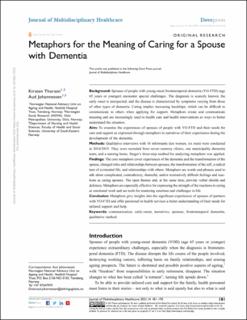| dc.contributor.author | Thorsen, Kirsten | |
| dc.contributor.author | Johannessen, Aud | |
| dc.date.accessioned | 2022-03-28T11:51:04Z | |
| dc.date.available | 2022-03-28T11:51:04Z | |
| dc.date.created | 2021-01-12T06:58:18Z | |
| dc.date.issued | 2021 | |
| dc.identifier.citation | Thorsen K., & Johannessen A. (2021). Metaphors for the Meaning of Caring for a Spouse with Dementia. JOurnal of Multidisciplinary Healthcare, 14, 181-195. | en_US |
| dc.identifier.issn | 1178-2390 | |
| dc.identifier.uri | https://hdl.handle.net/11250/2987997 | |
| dc.description.abstract | Background: Spouses of people with young-onset frontotemporal dementia (YO-FTD) (age 65 years or younger) encounter special challenges. The diagnosis is scarcely known; the early onset is unexpected; and the disease is characterized by symptoms varying from those of other types of dementia. Caring implies increasing hardships, which can be difficult to communicate to others when applying for support. Metaphors create and communicate meaning and are increasingly used in health care and health interventions as ways to better understand the situation.
Aim: To examine the experiences of spouses of people with YO-FTD and their needs for care and support as expressed through metaphors in narratives of their experiences during the development of the dementia.
Methods: Qualitative interviews with 16 informants (ten women, six men) were conducted in 2014/2015. They were recruited from seven memory clinics, one municipality dementia team, and a nursing home. Steger’s three-step method for analyzing metaphors was applied.
Findings: The core metaphors cover experiences of the dementia and the transformation of the spouse, changed roles and relationships between spouses, the transformation of the self, a radical turn of existential life, and relationships with others. Metaphors are words and phrases used to talk about complicated, contradictory, shameful, and/or normatively difficult feelings and reactions as caring spouses. The open themes and, at the same time, provide verbal shields and defences. Metaphors are especially effective for expressing the strength of the reactions in caring as emotional work and are tools for mastering emotions and challenges in life.
Conclusion: Metaphors give insights into the significant experiences of spouses of partners with YO-FTD and offer personnel in health services a better understanding of their needs for tailored support and help. | en_US |
| dc.language.iso | eng | en_US |
| dc.relation.uri | https://www.dovepress.com/getfile.php?fileID=66098 | |
| dc.rights | Navngivelse-Ikkekommersiell 4.0 Internasjonal | * |
| dc.rights.uri | http://creativecommons.org/licenses/by-nc/4.0/deed.no | * |
| dc.title | Metaphors for the meaning of caring for a spouse with dementia | en_US |
| dc.type | Peer reviewed | en_US |
| dc.type | Journal article | en_US |
| dc.description.version | publishedVersion | en_US |
| dc.rights.holder | © 2021 Thorsen and Johannessen. | en_US |
| dc.source.pagenumber | 181-195 | en_US |
| dc.source.volume | 14 | en_US |
| dc.source.journal | Journal of Multidisciplinary Healthcare | en_US |
| dc.identifier.doi | https://doi.org/10.2147/JMDH.S289104 | |
| dc.identifier.cristin | 1869492 | |
| cristin.ispublished | true | |
| cristin.fulltext | original | |
| cristin.qualitycode | 1 | |

